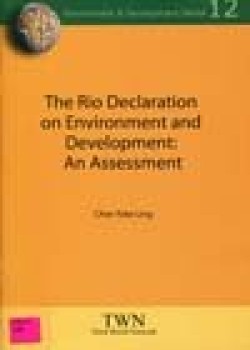
The Rio Declaration on Environment and Development
An Assessment
Author : Yoke Ling C.
Publisher: Third World Network
Place of Publish: Malaysia, Penang
Year: 2012
Page Numbers: 66
Series: Environment & Development Series 12
Acc. No: 4627
Class No: 333.7 LIN
Category: Books & Reports
Subjects: Environment and Natural Resources
Type of Resource: Monograph
Languages: English
ISBN: 978-967-5412-48-6
In 1992 the historic UN Conference on Environment and Development (UNCED, popularly known as the Earth Summit) held in Rio de Janeiro, Brazil witnessed unprecedented political will and commitment among governments to make a paradigm shift to sustainable development. Acknowledging the twin crises of poverty and the environment UNCED concluded that the prevailing economic model was unsustainable. The Rio Declaration on Environment and Development that emerged from intense discussion, debate and negotiations was thus the framework of principles adopted by Heads of States and Governments for that paradigm shift. Almost 20 years later, as governments, civil society organizations and international institutions prepare for the UN Conference on Sustainable Development in June 2012 to be held again in Rio, there is growing questioning by the North, and even rejection by some governments of the North, of some of the most fundamental of the Rio principles. The spirit of Rio 1992 was generally one of multilateralism, cooperation and solidarity based on the fundamental principle of common but differentiated responsibilities even though the North had shown reluctance in crucial issues such as reforms in global economic systems and taking the lead in changing consumption and production patterns. Today, that spirit is ebbing as competition and inequities dominate international relations. The objectives of Rio+20 is "to secure renewed political commitment for sustainable development". We hope that this booklet that provides a summary of the negotiation history of the Rio Declaration can contribute to the said objective. This paper traces the negotiating process that produced the Rio Declaration, highlighting the key developments as negotiators battled through weeks, often into the early hours of the morning by the time of the fourth and last Preparatory Committee meeting (2 March to3 April 1992). That was the most intensive session, as the pressure to resolve fundamental North-South differences reached its height. Indeed, there were many moments when negotiators and NGO observers wondered if the Summit would even see a consensus on the Declaration. A section is also included to provide a background to the evolution of UNCED from the 1972 Stockholm Conference.



